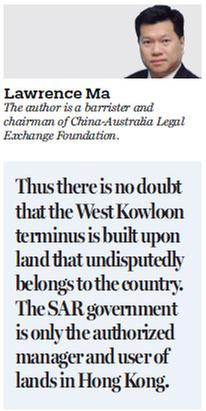Rail link co-location abides by Basic Law

Lawrence Ma pours cold water on the 'Annex III legislation' and 'land cession' arguments put forward by opponents of the joint checkpoint plan, essential for an effective rail link
The vast majority of Hong Kong residents look forward to the high-speed rail link connecting the city with the Chinese mainland. Almost all Hong Kong people have realized that a co-location arrangement, inviting mainland law-enforcement officials to the West Kowloon terminus, will enable speedy boundary control operation and maximize the power of this massive transport link. This is evident in various opinion polls conducted by organizations across the political spectrum.

However, some recalcitrant and bigoted opposition politicians twisted the discussion by denying the constitutionality of any legislation implementing the co-location arrangement which lets mainland laws apply in the restricted area.
Among all provisions, they commonly quote Article 18(2) of the Basic Law, which provides that national laws are not to apply in Hong Kong except those listed in Annex III.
However, they failed to notice that the co-location arrangement is limited to a designated area within the West Kowloon terminus only and laws in Annex III are intended to apply to the entire city of Hong Kong.
Admittedly, if the Legislative Council enacted a law to allow mainland laws, other than those listed in Annex III, to apply in the city this would be in breach of the article and the law is no doubt unconstitutional.
However, if the legislation is to ratify a decision made by the nation's top legislature - the National People's Congress Standing Committee (NPCSC) - allowing the HKSAR to establish the co-location arrangement and mainland laws to apply in the designated area, this constitutional repugnance would be resolved.
This is similar to the National Flag and National Emblem Ordinance (Instrument A401) which gives effect to the city's national flag law.
In the landmark decision of constitutional jurisdiction in the well-known case of Ng Ka-ling v The Director of Immigration (No 2) (1999) 2 HKCFAR 141, the Court of Final Appeal emphatically conceded that Hong Kong courts could not "question the act done by NPC or NPCSC which is accordance with the provisions of the Basic Law".
The case demonstrated to the public that NPCSC decisions are legitimate and constitutional in Hong Kong's legal system. Thus the co-location plan is well grounded legally.
Meanwhile, the same batch of politicians is also trying hard to mislead the public by claiming the arrangement is "cession of land" by the SAR government to the mainland.
Cession is not whatever lies in their mouths. It is a recognized concept in international law. Legally, it is the peaceful transfer of sovereignty over territory or property from one state or government to another. It often takes place within the framework of a peace treaty following a war. Cession occurs by signing an international treaty between two sovereign countries and is effected by legal transfer and taking of control of land by the recipient state.
In a word, the state that purported to have its land transferred must have sovereignty over it, before it resumes a legal right to assign. Citing a common experience, a vendor has to establish ownership of his real property, be it a house, apartment or a car-parking space, otherwise he has no proper legal title to sell or transfer such property in private law.
Question then arises: Who owns the land in the West Kowloon terminus control point?
The legal status of the People's Republic of China is an independent sovereign country recognized by international law and also by the United Nations as a member state. All land, the air space above and the continental soil below (covering and extending to and over the entire exclusive economic zone) belongs to the country that, recognized by international law, is the sovereign.
The PRC is the legally recognized sovereign over all territories of China including the Chinese mainland, Taiwan, the Hong Kong SAR and the Macao SAR. Article 7 of the Basic Law unequivocally provides that "the land and natural resources within the HKSAR shall be State property".
Thus there is no doubt that the West Kowloon terminus is built upon land that undisputedly belongs to the country. The SAR government is only the authorized manager and user of lands in Hong Kong.
(HK Edition 08/18/2017 page11)
Today's Top News
- US actions fail to match its words on Taiwan question
- China's diplomacy to blaze new trails
- Visits point way to better future for all
- PLA tests joint combat strength for second day
- Xi stresses advancing rural areas' vitalization
- US arms sale to Taiwan will lead secessionists toward destruction






























